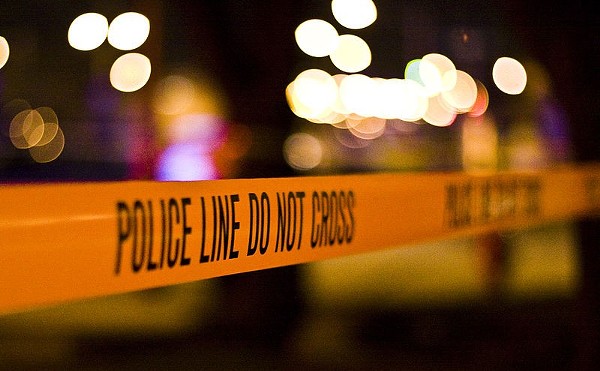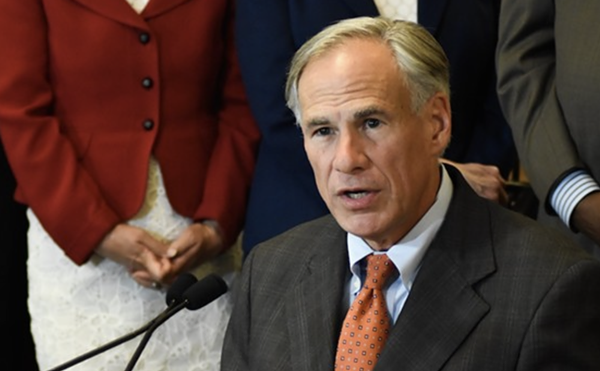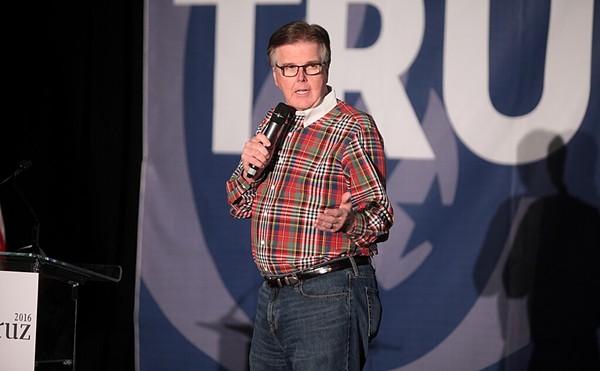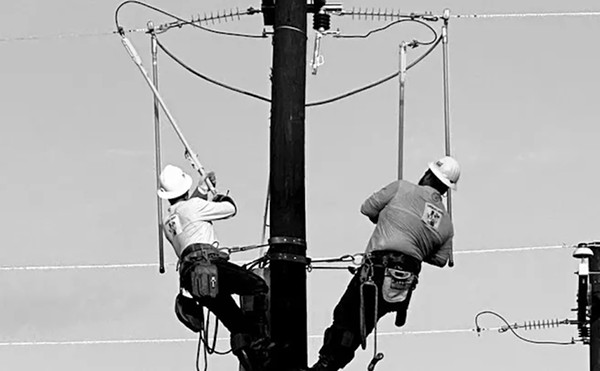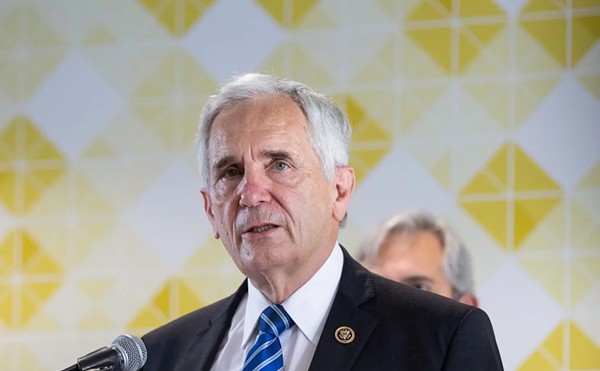Paul Douglas is running against the grain. He is a Republican who acknowledges the reality of human-caused climate change. Republicans tend not to agree with the science, despite the overwhelming — 97 percent — consensus among climatologists that human-created emissions are warming the planet, causing climate change, and triggering extreme weather.
For example, a Bloomberg national poll released in early October said that while "78 percent of Democrats and 56 percent of independents believe humans are warming the earth … almost two out of three Republicans don't."
The Minneapolis-based Douglas is also a nationally recognized broadcast meteorologist, and the majority of people in his profession don't necessarily acknowledge the level at which humans are causing climate change. According to a 2011 report by the George Mason University Center for Climate Change Communication, only 53 percent of broadcast meteorologists said that human influence plays an important role in climate change — with 34 percent saying climate change is a result of human and natural causes, and only 19 percent saying it is mostly human-caused.
Douglas would place himself with the 19 percenters, adding that he believes "human activities, the burning of fossil fuels and a 40 percent spike in greenhouse gases are having an impact on warming the atmosphere and the oceans — where 90 percent of the warming has gone in the last four decades."
Every day, we get better at connecting the dots of climate change and extreme weather. As NASA's James Hansen said in August: "The deadly European heat wave of 2003, the fiery Russian heat wave of 2010, and catastrophic droughts in Texas and Oklahoma last year can each be attributed to climate change."
Earlier last year, Douglas argued in his blog that Republicans were wrongheaded to ignore climate change. "Some in my party believe the EPA and all those silly 'global warming alarmists' are going to get in the way of drilling and mining our way to prosperity," he wrote. "Well, we have good reason to be alarmed."
Later in the year, he wrote a direct message to Mitt Romney via Huffington Post, exhorting the Republican presidential candidate to acknowledge the reality of climate change, and impress upon his party the severity of our current predicament.
"If Mitt Romney is genuine about his promise to 'help you and your family,' he needs to acknowledge this, and work for a solution that will solve both the economic and the climate crisis," Douglas wrote.
We talked to Douglas recently about his stance on climate change, the phenomenon that is literally changing the world as we know it.
Jim Poyser: When did you begin to take note of climate change?
Paul Douglas: All of us have different thresholds for when you acknowledge the science. For me it was when James Hansen went before Congress in 1988. I thought he was jumping the gun. I didn't see it. But after living the weather — and that's what any meteorologist does, you live the weather — I just noticed in the mid and late '90s that something had changed.
How so?
It was no longer my grandfather's weather. The rain was falling with greater ferocity. We were seeing more extremes with greater frequency and greater intensity than I had ever witnessed in my career.
So I started digging into the peer-reviewed science and basically came to the conclusion that climate scientists were probably right, that there's just too much evidence.
We are a part of nature. I don't see anywhere in the Bible where it says that we're supposed to dominate nature. The book of Luke says, "We are stewards and we will be accountable for our stewardship." I take that seriously.
When I talk to my friends on both sides of the aisle politically I say, "We're accountable. You should care about this. If you care about your kids and your grandkids, as our parents cared for us, this is not only a scientific issue, it's a moral issue and an ethical issue."
There is something fundamentally immoral about kicking the can down the road and saying, "Well, not enough data and maybe it's real but our kids and our grandkids can clean up our mess."
When did you begin to talk about climate change as part of your job as a broadcast meteorologist?
In the late '90s I began including it in my weather statements.
Was anybody else doing it at that time?
No, no. The pervasive feeling at the time was that … if you even mention the term global warming or climate change you will instantly alienate 30 percent of your audience and they will tune out. So, you know, it's kryptonite.
Every day I would get scores of emails like, "Flaming liberal. You crazy crackpot. Why are you buying into this Al Gore conspiracy? You're going to cripple our economy."
It is the equivalent of sticking your finger in the electrical socket. Most of us are conditioned to avoid pain, to avoid controversy. Everybody on television wants to be loved and your contract — whether you're renewed — really depends on your ability to attract an audience. Just by reporting on this you know that you're alienating people with a certain ideology.
This science, as strong as it is, is toxic to a lot of these people who just can't or won't accept peer-reviewed science because it does not fit in with their worldview. My entire life I've voted Republican and I'm a moderate Republican, which is kind of an oxymoron these days, but I've been very moderate in my beliefs. I'm fiscally conservative, socially liberal.
Yet you persisted.
I persisted and I continue to persist because the subject is too important. I thought it was ludicrous that this was somehow a litmus test for conservatism.
I remind my Republican friends that Teddy Roosevelt, staunch Republican, founded the National Parks Service. Richard Nixon, say what you will about Dick Nixon, and I'm not a huge Nixon fan, but he started the EPA. There is a history of environmental respect, respect for the environment.
"I'm proud of having been one of the first to recognize that state and national government have a duty to protect our natural resources from the damaging effects of pollution that can accompany industrial development." You know who said that?
Teddy Roosevelt?
Ronald Reagan. July 19, 1984. Somewhere along the way, the Republican Party became totally beholden to fossil fuel interests.
I'm not saying we don't take advantage of our natural resources. The message I'm trying to get out is that by fixating exclusively on fossil fuels, not only are we endangering future generations, we are endangering our competitiveness down the road. Because there is no debate about climate change in Europe or China.
They are moving forward with clean alternatives to creating energy. If we totally focus on mining and drilling and extracting every last bit of carbon at the exclusion of solar and wind and geothermal and battery technology and everything else that's out there, we are going to be crippled as a country competitively. The point I'm trying to make as a jobs creator is that this is a chance to reinvent and retool America, wean ourselves off foreign oil.
I like to think we're at a turning point: the thirst for knowledge about what is happening to the climate is growing.
It's ironic that extreme weather has accomplished what the climate scientists up until now could not. And that is convince a majority of logical, God-fearing Americans that something has changed.
[According to a Yale University poll], four out of five people last year were personally impacted by extreme weather. One out of three were physically injured by severe weather last year.
This weather-on-steroids environment is getting people to wake up. I keep telling people that trillions of dollars are in play. Fossil fuel companies are scared to death that they're going to be regulated out of existence or that there will be regulations that they can't drill and mine, and that will affect their share price, their stock price, and their ultimate company value.
JP: Are Republicans listening to you?
PD: No. No. Frankly, to some degree I've been, not ostracized, but I think ignored. I'm OK with that. I'm going to keep speaking out, because this is too important.
What I am finding is that younger people, younger conservatives, younger evangelicals are listening. They respond to data. That's one of the first things that I say when I go out and talk. I ask people, "Do you have an open mind? Or is your mind made up and you're going to cherry-pick data to support your ideological beliefs?"
I find that, for most people under the age of 35, this is an issue that they really feel will impact their lives and their kids' lives. They are paying attention…
JP: What do you visualize the world being like, 20 years from now?
PD: I think it's going to be a lot different than it is now. There's a significant amount of warming going on in the pipeline. Even if we could somehow magically bring our greenhouse emissions down to zero, I think there's little doubt that we're going to warm at least a degree, maybe a degree and a half. I see no evidence really that we're going to take the steps necessary to mitigate greenhouse gases. I think there's going to be a huge push toward adaption. How do we survive and thrive in this warmer, drier, stormier new world?
That means everything from new drought-resistant crops that can weather the extremes that I know we're going to see. Climate scientists say that this is just the tip of the iceberg. This is just the beginning from what we're seeing. Everything from huge impacts on agriculture to trying to mitigate sea-level rise and levies and storm walls.
As a businessman it's a threat and it's an opportunity and this may be one way to reach some conservatives. If you tell them, "Hey, by being obstinate, by denying the science, you are leaving money on the table. You are overlooking an incredible investment opportunity." I tell my conservative friends that in the Pentagon, insurance circles, there is no debate about the science.
If you ignore this, it's going to show up in your portfolio. You will shoot yourself in the foot with your investments. You have to stay up on the science, you have to listen to new data, otherwise, you're going to watch your portfolio shrink. Is that what you want?
JP: What about Superstorm Sandy?
PD: Although you can't prove direct causation with Sandy, in my humble opinion — and that of most of the climate scientists I know — it's a case of systematic causation. We've loaded dice in favor of more extreme storms, heat waves and drought. We've super-sized our weather … the timing, scale and scope of the storm were extraordinary — like nothing I've ever witnessed, a hybrid of hurricane and Nor'easter that is not very well understood.
Sandy was made worse by unusually warm ocean water in the Gulf Stream, and the record melting of polar ice in September may be creating a blocking pattern in the upper atmosphere that favors major storms, especially for the eastern third of the USA — a trend in recent winters. It would have been a major storm without a hurricane in the core, but the combination of Nor'easter powered by temperature extremes and a hurricane powered by warm ocean water created a meteorological bomb that impacted a huge swath of coastline. Again, fairly unprecedented historically. And the fact that Sandy impacted a densely populated region of the USA meant more people affected, and brought additional media attention.
Weather has always been severe, but now a warmer climate is flavoring ALL weather. The frequency and intensity of extreme weather events is on the rise, and Sandy was just the most recent and visible manifestation of this trend across North America.
With Texas, and the broader U.S., fresh off its hottest year on record, scientists are increasingly warning us to brace for more intense hurricanes coupled with longer stretches of drought. As it stands, nearly two-thirds of Texas' 254 counties have been declared natural disaster areas due to drought and heat.
But should you be hearing any of this from your local weather (wo)man? Last year a number of environmental groups gathered to form Forecast the Facts, a campaign aiming to out TV meteorologists who deny mainstream climate-change science – namely that it's real, caused largely by humans, and that it's already starting to profoundly impact our world. The American Meteorological Society (which held its annual convention in Austin last week) last year updated its stance on the topic, putting out a policy statement stating that extensive scientific evidence points to "human-induced increases" in greenhouse gases as the main culprit for rapid climate change over the past half century.
The group now wants the AMS to adopt tighter certification standards to weed out human-caused climate change deniers. "A certification from [the AMS] says this person has their stamp or their approval," said Forecast the Facts campaign director Daniel Souweine. "When some of these meteorologists go out there and say wildly inaccurate things about climate change, it seems like an empty certification."
Where do our local weather guys stand on the idea of human-caused climate change? Read the full Q&As below.
---------------------------------------------------------------------------
All interviews were conducted by Michael Barajas and edited lightly for grammar and length.
BILL TAYLOR, KENS 5

Is the planet undergoing significant climate change?
Yes, in the sense that it's undergoing a warming. You really can't argue with that. The temperature has gone up globally, and there are some ramifications to that. You might get some more intense hurricanes. You might see more glacial melt. There might be some repercussions of a warming planet. So, if that's all under the umbrella of a warming planet, then yes.
Are humans causing it?
That's what I disagree with. From what I've read, and there's a lot of solid science on the other end of this issue that really doesn't get as much exposure unfortunately, I disagree with it being human caused. I really fall into a category that says climate change is part of the natural earth process; that this is a cycle our planet is undergoing. There's a lot of research that indicates the sun cycles, which is a 12-year cycle, has a lot to do with our planet's temperatures. I say, if we occupy less than 30 percent of this planet spinning on its access at a thousand miles per hour while orbiting the sun at 65,000 miles per hour, I just can't draw a line that what we do on this planet has any effect on it. I did this story at Kens, and this is going back 15 years, and a local geologist put it this way: “We're like ants on a bowling ball. There's a ton of us, but we can't do anything to it.” I've always ascribed to that.
I didn't do the research myself; I'm just a TV weather guy. Richard Lindzen is one I really respect and read, and he's a meteorology department head at MIT. And he says while you have a warming earth, and while you have increasing greenhouse gases and emissions from human beings, you cannot draw the conclusion that we're causing it.
Why is this issue so controversial?
It's a vicious debate, and it started a long time ago. The machine of this belief system of human caused global warming was under way 20, 30 years ago. It truly is a machine. You saw the university that got busted with the emails, where scientists were telling each other what to say. It's a very protective, secretive almost, club. And if you're not agreeing with them, you're wrong. And you're close-minded. And that to me is so wrong because this is science. And for it to be science it must be open and tested. They have literally shut the door on scientists who believe otherwise. It's a shame. So why is there controversy? I know there's a lot of money invested in alternative means of energy for us. Whether that's part of it, I dunno. But anytime science becomes political, it's bad. Anytime politicians take over and start talking science, it never goes well.
What about the vast, vast majority of peer-reviewed articles over the past decade pointing to human-caused climate change?
Globally, when we're talking about global warming and world temperatures, I just don't see how anything we can be doing on this planet has any effect on this huge rock floating in space.
Is there any reason to make mention of climate change in forecasts?
I don't think so. Only in the sense that it's a time issue more than anything else. It's so debatable and there's so much science that's left out. In order for us to start using it in a weathercast, we'd have to sacrifice more important information that people live and die by. I don't know if it's time for that. I don't know if it ever will be time for that.
(Taylor also suggests readers check out http://climatedebatedaily.com/, which he says he regularly reads).
JOHN GERARD, WOAI

Is our planet undergoing significant climate change?
Oh there's no doubt about it. The numbers don't lie.
Are humans causing it?
I think the science is leading us to believe more and more that humans have more to do with this than we thought. I'm still not convinced that this is primarily what humans are doing. There may be a human contribution to this; there may be a human element. I tell everybody the same thing: if we are or even if we're not, we still need to be good stewards. We still need to be smart with our resources. There's not an endless supply of stuff on this planet. We just need to take better care of it. If this is the catalyst that gets people to be more environmentally conscious, then great. But what makes up the bigger slice of the pie, as far as the contributing factors? I just really don't know. I'm not going to point fingers at industry; I'm not going to point fingers at China. I don't think there's enough data. But there's more data every day. We're able to go further in time. We can connect the dots better now than we ever could. But I still don't think we're there yet.
Why is this topic so controversial?
It's hard to say. I think there's an economic component to this. The way I look at it, I'm the father sitting at the dinner table and I've got two kids. My one kid is screaming and yelling at one, and I've got the other one yelling back. You're trying to digest all of this as a good parent, but finally you slam your hands on the table, get both of their attention, and scream, “enough already.” Getting people to just shut up simmer down and think this through without pointing fingers, I think, should be our goal. We'll accomplish more that way. I feel like everybody's screaming at each other. Unfortunately, things like Climate Gate and stuff like that doesn't help.
I think that there's fear of change. Maybe that's why people get so outraged. I think there might be a political agenda. I think there might be an economic agenda. And I think there's been a clear line drawn in the sand separating both sides. It's terrible. I think both sides could really bring a lot to this discussion, but I think that people are tuning it out because they're tired of the screaming and yelling.
Given climate change, what's in Texas' future that concerns you?
I think it's a combo package here. The droughts are becoming more long lasting and more severe. I also think that the rising seas are going to be a major issue. A sea level rise of even an inch or two spread out over the entire world oceans is a lot of water. That will flood a lot of coastal communities when storms hit, even in areas that aren't used to flooding. We're talking about a weather component to climate change that's not just an inconvenience. It's going to be an entire lifestyle change that future generations are going to have to consider. The issue isn't where there's global warming. I think you'd have to be a fool to say there's not. The issue is what's causing it. If we have to argue about what's causing it, then maybe what we need to do in the meantime is just acknowledge it, take that as a first step, and say be careful where you live, be careful what you do with your resources. And let's have a civilized conversation about how it got there and what we do about it going forward.
Should meteorologists connect what climatologists are saying to the immediate effects, the real world weather on the ground?
In a perfect world we'd all be one big happy family of weather forecasters. But meteorology and climatology are two very different animals. Meteorologists are focused on the short term. Let's get out there and try to get the next seven days right. Climatologists are trying to get the next seventy years right. I think in many ways, meteorologists are held more accountable because you can see the immediate results of our forecasts. But a climatologist could be wrong and there's nobody in this generation that would know that.
In covering extreme weather, for instance, is there any context in which it would be appropriate to mention or to address what the science says about climate change?
I do get emails on this. I do get people saying, “When this storm hits, how come you never attribute it to climate change?” It's because I kind of shy away from getting into the debate. I'm not sure many in the meteorology community feel comfortable saying that just yet. There's a loud argument on this other side that says it (climate change) might not necessarily be true. And you're just adding fuel to the fire of an already polarizing topic.
The minute I go there, I've already taken sides. I've taken sides, and the science doesn't matter. It becomes personal for people. If there was a way for me to tell people, “these storms are getting bigger, we're going to see them more often, they're more dangerous, sea levels are rising.” If I could say all this stuff during my weathercast without people further trying to split hairs on the issue, if I could say it without people making it personal, I would feel more comfortable about people doing just that. But unfortunately, as soon as you mention the C word, climate, or the G word, global, right away people tune out the science you're trying to present and they like you or they don't like you. And it's not really my job as a broadcast meteorologist to conquer and divide. It's to give people tomorrow's weather.
STEVE BROWNE, KSAT

Do you believe the planet's undergoing significant climate change?
Do I believe it's undergoing climate change? Yea. Do I believe it's significant? I'm not so sure about that, but it's definitely changing.
What's the human role?
I think the science is pretty much convergent on the same idea: That climate change is being caused by human beings, although I can find some of my colleagues that would disagree with that. There's no denying the fact that we have changed the chemistry of the entire planet, the atmosphere. Carbon dioxide levels have gone up significantly from 280 parts per million to almost 400 parts per million. And they just keep going up. When you change the chemistry of the entire planet, it changes the balance of the planet. There's no way you can deny that's happening. The only question I raise when you ask me is how significant is it: I believe it's fairly significant. It's been about a degree and a half Fahrenheit since the industrial revolution. That doesn't sound like a whole lot, but it does have a significant impact on how much water vapor the atmosphere can handle. For every degree Fahrenheit the temperature goes up, the atmosphere can absorb another 5 percent water. So we're up into about 7 and a half percent more water in the atmosphere, which means your flood events are going to be a lot more intense. And on the other side of it, if it's not raining, the drought evens are going to be more intense because you can evaporate water out of the ground that much faster.
Why is there so much controversy surrounding this topic? Is it fair to drag meteorologists into it?
I've been studying this since the mid 1980s. Everything climatologists told me was going to happen has pretty much happened. They said things like first freeze dates would be later, last freeze dates would be earlier, the growing season would expand in the north. They said droughts would be more severe and floods would be more severe. Has that happened? Yea. They also said snow storms would be more severe. And every time it snows, people say, “Ah, so what about global warming?” It's just because the atmosphere can hold more water. They also said most of the world's glaciers would continue to shrink, and they have. They said the polar ice cap would start to deteriorate, and it has. That sea levels would rise; they have. Almost everything they said has happened, it's' just a very slow process.
I think it became political after Al Gore released his movie, mainly because he's such a polarizing figure. He's a left wring liberal, as some would say, so he's very polarizing. When he put out that movie, it was just a bunch of people jumping on the bandwagon saying he's full of crap. And I just don't think that's fair. I don't think it should be political. I tend to be conservative myself, but I'm not an ultra right wing.
There's Rush Limbaugh and people who just automatically say it's all malarkey, that it's a bunch of crap. They're not looking at what's happening. They're not seeing what's happening. Its' right in front of all of our faces. It's just a slow process. A degree and a half (temperature rise), the consequences are undeniable. When you increase carbon dioxide, you change the chemistry of the atmosphere. This has never happened in the history of the planet, one species changing the chemistry of the entire planet. That's pretty profound, in my opinion.
You have people like James Hansen with NASA saying we're getting better at connecting the dots between extreme weather and climate change. Is there any reason for meteorologists to make that link on the air?
Personally, I think I have an obligation to say what I think, so that's why I'm talking to you. There are other people inside my building that would totally deny it. I just happen to disagree with them. I do think I have some obligation to say what I think. But I'm not a climate scientist, I'm an observer. I've just been doing it a long time. I've seen our climate change.
Any time new facts come up, I always put them on the air. When the ice caps melt, I show pictures. We had record sea ice loss around the North Pole last year, and we have access to those pictures, so I put them on the air. Facts are facts. We just closed out the hottest year in history in the United States. We did. It's a fact. I will mention those facts as they become available. But I can't persuade people to believe what they don't want to believe. I think the latest research I saw said about 80 percent of people believe this is happening now, but there's still 20 percent who are deniers, and they put out a lot of false data on the internet. But people will pick up on it and regurgitate it. You can't help those people.
ALEX GARCIA, FOX 29 (interview by email)

Do you believe the planet is undergoing significant climate change?
Well, you have to be careful about how you use the word “significant.” Not all researchers see eye-to- eye on what is “significant.” Let's think more along the lines of whether our not our planet is undergoing climate change. The answer to that question can be found in the atmospheric records. Thousands of measurements are made daily on land, at sea, and in the air. Additionally, we also use satellites to supplement those measurements. The datasets produced by these measurements show there is a warming trend in our global temperature. Last year was the warmest year on record here in the United States. Our average temperature was 55.3 degrees, 3.2 degrees F above the 20th century average. Clearly, the planet is warming up. There are many indicators this is happening. Polar ice is melting, glacier volume is shrinking, sea levels are rising, ocean heat content is rising.
Are humans causing it? Where does the science stand on the issue?
This is a controversial topic for some. Taking a look at the evidence and not the politics will give us a clear look at the answer. There have been many studies on this topic. The primary studies have looked at how our atmosphere responds to “greenhouse gases.” Quickly, a greenhouse gas is one that absorbs heat and re-radiates it back out. Most people quickly name Carbon Dioxide as a greenhouse gas. Many do not realize that water vapor also acts as a greenhouse gas. There are other studies that study climate variability through time as far back as 2,000 years or so. These involve studying tree-rings, corals, and deep ice cores. There are also climate models. These are complex programs that utilize the data sets we have collected to create a “model” of the climate. It's the climate models that show human-induced changes to the climate. These models show human induced changes on global temperatures through the burning of fossil fuels, and agricultural practices — burning. Clearly, as the evidence grows, the finger of climate change is pointing in our direction.
The topic has become politicized. When you bring politics into any discussion it gets emotional and off the facts of the topic at hand. Any discussion of climate change should focus on the data and facts, the science, not the emotionally charged political rhetoric.
How is Texas likely to be impacted?
Well, Texas is a big state with a number of climatic regions. Trying to pinpoint what specifically will happen across the state is a tough call. Let's take a look at some general scenarios. Texas has about 3,000 miles of coastline if you count all the islands, bays, and river mouths. We have an incredible number of people living along the Texas coast. Sea-level rises will impact these areas. Add a tropical system and storm surges become a great concern.
The current drought has been hard on Texas; certainly one of the worst since the drought of the 1950s. A continuation of drought conditions will impact the area in many ways from infrastructure, business, agriculture, and more, as water becomes a scarce item. Air quality is another area of concern, with ozone levels inching upward as weather patterns hold the particulate matter in place. Warm winter seasons leave an abundance of insects and other pests that can be a factor in transmitting diseases or destroying what crops can grow.
Climate change can have many faces, without talking about hurricanes, tornadoes and such. Texas is a big place and a big target for its impacts.
Do you think there's a reason to mention climate change when reporting extreme weather conditions or events?
It is difficult to say with any certainty that climate change caused any one of a number of extreme events, like an EF5 tornado or a category 5 hurricane. Climate and the atmosphere are so complex and dynamic that the best we can do is look at trends. Again, we have to look at the science. Scientists have gotten better at looking at all the variables to go into making weather events. The bottom line is that while we cannot connect climate change to any single event, we can also not discount the fact that climate change is making an impact on them.”




